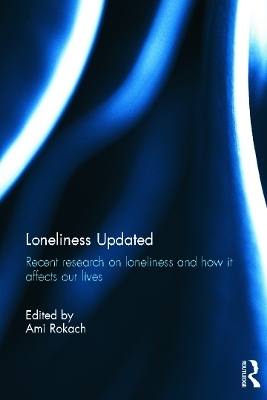
Loneliness Updated
Routledge (Verlag)
978-0-415-62325-4 (ISBN)
"To be alone is to be different. To be different is to be alone, and to be in the interior of this fatal circle is to be lonely. To be lonely is to have failed" (Susan Schultz, 1976)
Loneliness carries a significant social stigma, as lack of friendship and social ties is socially undesirable, and social perceptions of lonely people are generally unfavourable. Lonely people often have very negative self-perceptions, believing that the inability to establish social ties is due to personal inadequacies or socially undesirable attributes.
This book is divided into three parts. The first part reviews loneliness in general, describing what it is and how it affects us. The second part examines loneliness throughout the life cycle, analysing how it affects us in childhood, adulthood and as we age. The final part explores the connection between loneliness and other conditions such as arthritis, eating disorders and depression.
Loneliness Updated offers the latest research on how loneliness can affect us in our daily lives, and how it is expressed as we travel through life from childhood to old age. It will be a highly interesting read for scholars, students and researchers of clinical psychology, particularly those interested in further exploring the effects and consequences of loneliness.
This book was originally published as a special issue of The Journal of Psychology.
Ami Rokach is a clinical psychologist who has been exploring loneliness and its effects for the past 30 years. Aside from helping people deal with their loneliness and pain, he also teaches in the psychology departments at York University in Toronto, Canada, and The Centre for Academic Studies, in Israel.
1. Loneliness Updated: An Introduction Part I. A Review of Loneliness 2. Is Loneliness the Same as Being Alone? 3. Loneliness, optimism, and wellbeing among married, divorced, and widowed individuals 4. Loneliness and Emotional Intelligence 5. Is it Lonely at the Top? An empirical study of managers' and non-managers' loneliness in organizations Part II. Loneliness Throughout the Life Cycle 6. Children's Loneliness, Sense of Coherence, Family Climate and Hope: Developmental risk and protective factors 7. The prevalence of loneliness amongst adults: A case study of the United Kingdom 8. Association between Loneliness and Suicidality during Middle Childhood and Adolescence: Longitudinal Effects and Role of Demographic Characteristics 9. Family of Origin Environment and Adolescent Bullying Predict Young Adult Loneliness 10. When it's just me at home, it hits me that I'M COMPLETELY ALONE: An online survey of adolescents in self-care 11. Loneliness, Depression, Social Support, and Quality of Life in Older Chronically Ill Appalachians 12. Life Events and Personality Predicting Loneliness Among Centenarians: Findings from the Georgia Centenarian Study 13. No place like home? Potential pathways to loneliness in older adults under the care of a foreign home care worker 14. Cross-National Differences in Older Adult Loneliness Part III: Loneliness and Other Conditions and Maladaptive Behaviors 15. Loneliness in Patients with Rheumatic Diseases: the Significance of Invalidation and Lack of Social Support 16. Loneliness and Eating Disorders 17. Loneliness and Depressive Symptoms: The Mediating and Moderating Role of Uncontrollable Ruminative Thoughts 18. Medicine, Radiology, Hospitalization and Loneliness
| Erscheint lt. Verlag | 19.11.2012 |
|---|---|
| Verlagsort | London |
| Sprache | englisch |
| Maße | 156 x 234 mm |
| Gewicht | 612 g |
| Themenwelt | Geisteswissenschaften ► Psychologie ► Arbeits- und Organisationspsychologie |
| Geisteswissenschaften ► Psychologie ► Entwicklungspsychologie | |
| Geisteswissenschaften ► Psychologie ► Psychoanalyse / Tiefenpsychologie | |
| Geisteswissenschaften ► Psychologie ► Sozialpsychologie | |
| ISBN-10 | 0-415-62325-1 / 0415623251 |
| ISBN-13 | 978-0-415-62325-4 / 9780415623254 |
| Zustand | Neuware |
| Haben Sie eine Frage zum Produkt? |
aus dem Bereich


